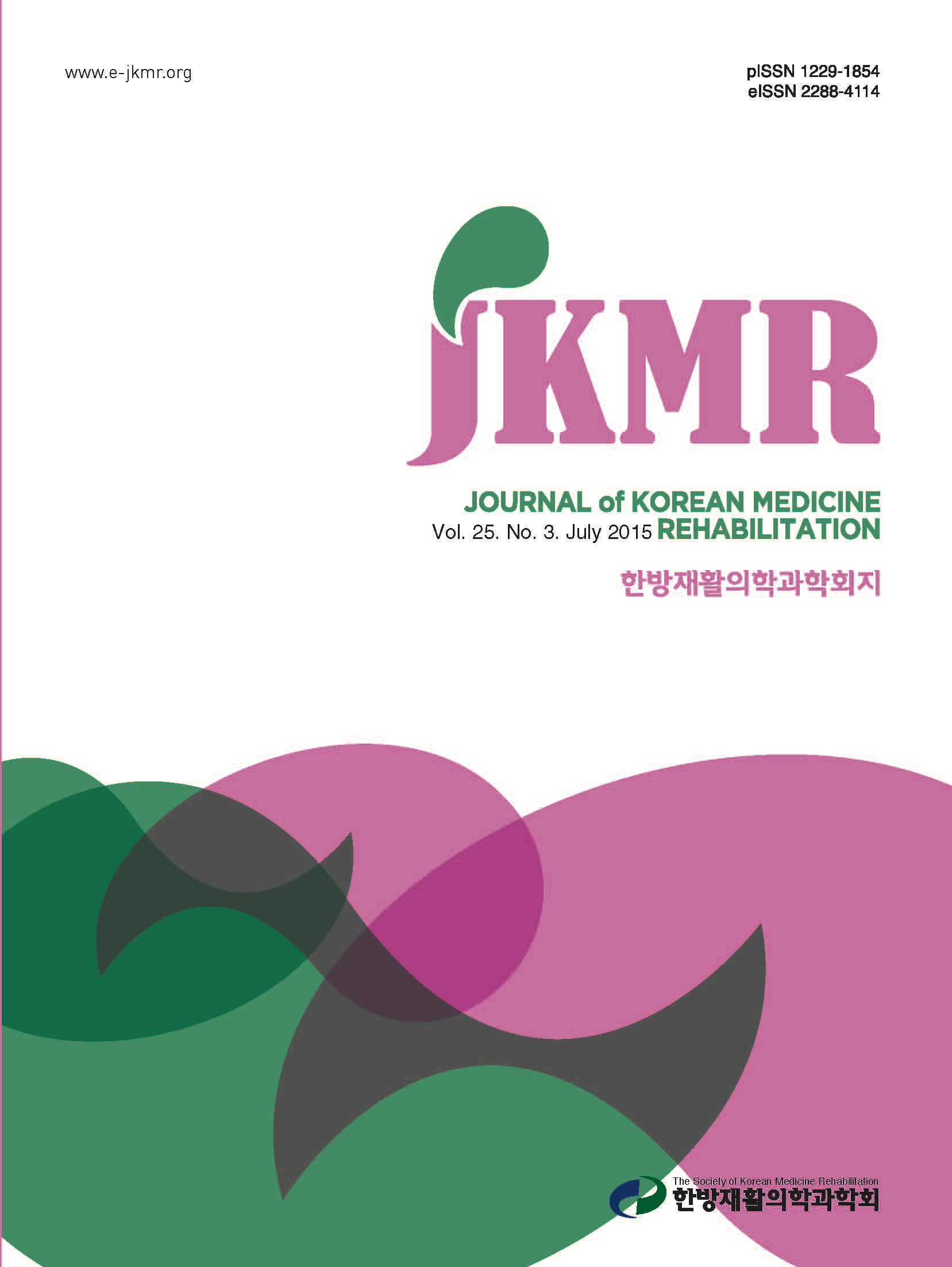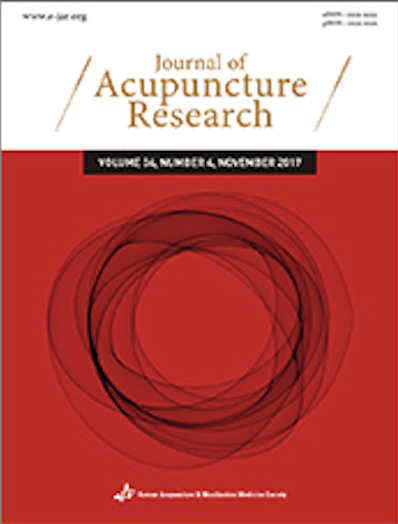Rotator Cuff Injury
How to submit an article:
- Registered users can submit any published journal article that has a unique DOI (Digital Object Identifier) name or link to Research Hub.
- For example, you can paste the full DOI link:
https://doi.org/10.1109/5.771073or just the DOI name:10.1109/5.771073into the field above and click submit. - The person who is first to submit a valid article to Research Hub will forever be credited for it, and every article submission earns you +6 Research Points.
Related Topics
Published research studies are articles that present the findings of original research that has undergone a peer-review process and has been made publicly available in scholarly journals, books or other media.

Effects of Acupuncture after Rotator Cuff Surgery: A Systematic Review
2021 Oct 31 Journal of Korean Medicine Rehabilitation Lee SJ, Ko YM, Park JS, Park TY, Lee JH, Cho JH, et al.
Systematic Review Rotator Cuff InjuryAcupuncture appears to have positive effects in pain relief and functional recovery after rotator cuff surgery.

Acupuncture Treatment for Shoulder Impingement Syndrome: A Review of Randomized Controlled Trials
2021 Aug 31 Journal of Acupuncture Research Park JE, Kim WY, Lee SJ, Oh DY, Lee MC, Jeon MK, et al.
Review Article Shoulder Impingement Shoulder Pain Rotator Cuff InjuryAcupuncture has been shown to significantly improve pain, disability, and quality of life for patients with shoulder impingement syndrome.

Acupuncture for Symptomatic Rotator Cuff Disease: A Systematic Review and Meta-Analysis
2021 Feb 28 Journal of Acupuncture Research Choi S, Lee J, Lee S, Yang GY, Kim KH
Review Article Rotator Cuff Injury Shoulder PainAcupuncture, in its various forms, shows significant potential in alleviating pain and improving shoulder function in patients with rotator cuff disorders.
Research insights are moderated by the Research Hub team and offer an at-a-glance overview of interesting research findings.

2021 Journal of Korean Medicine Rehabilitation
Acupuncture appears to have positive effects in pain relief and functional recovery after rotator cuff surgery.
Systematic Review
Effects of Acupuncture after Rotator Cuff Surgery: A Systematic Review
Lee SJ, Ko YM, Park JS, Park TY, Lee JH, Cho JH, et al.

2021 Journal of Acupuncture Research
Acupuncture has been shown to significantly improve pain, disability, and quality of life for patients with shoulder impingement syndrome.
Review Article Shoulder Impingement Shoulder Pain
Acupuncture Treatment for Shoulder Impingement Syndrome: A Review of Randomized Controlled Trials
Park JE, Kim WY, Lee SJ, Oh DY, Lee MC, Jeon MK, et al.

2021 Journal of Acupuncture Research
Acupuncture, in its various forms, shows significant potential in alleviating pain and improving shoulder function in patients with rotator cuff disorders.
Review Article Shoulder Pain
Acupuncture for Symptomatic Rotator Cuff Disease: A Systematic Review and Meta-Analysis
Choi S, Lee J, Lee S, Yang GY, Kim KH
Review Articles
Review articles summarise and critically evaluate the current state of research on a specific topic or field by synthesising multiple primary research studies.

Effects of Acupuncture after Rotator Cuff Surgery: A Systematic Review
2021 Oct 31 Journal of Korean Medicine Rehabilitation Lee SJ, Ko YM, Park JS, Park TY, Lee JH, Cho JH, et al.
Systematic Review Rotator Cuff InjuryAcupuncture appears to have positive effects in pain relief and functional recovery after rotator cuff surgery.

Acupuncture Treatment for Shoulder Impingement Syndrome: A Review of Randomized Controlled Trials
2021 Aug 31 Journal of Acupuncture Research Park JE, Kim WY, Lee SJ, Oh DY, Lee MC, Jeon MK, et al.
Review Article Shoulder Impingement Shoulder Pain Rotator Cuff InjuryAcupuncture has been shown to significantly improve pain, disability, and quality of life for patients with shoulder impingement syndrome.

Acupuncture for Symptomatic Rotator Cuff Disease: A Systematic Review and Meta-Analysis
2021 Feb 28 Journal of Acupuncture Research Choi S, Lee J, Lee S, Yang GY, Kim KH
Review Article Rotator Cuff Injury Shoulder PainAcupuncture, in its various forms, shows significant potential in alleviating pain and improving shoulder function in patients with rotator cuff disorders.
Clinical Trials
Clinical trials are research studies that involve people and are conducted to evaluate the safety and efficacy of new treatments or interventions, such as drugs, medical devices, or behavioural therapies.
Study Protocols
Published study protocols are detailed plans that outline the objectives, methodology, statistical analyses, and organisation of a research study that have been made publicly available for others to review and use as a reference.
Presentation Slides

Systematic Review
Acupuncture appears to have positive effects in pain relief and functional recovery after rotator cuff surgery.
Lee SJ, Ko YM, Park JS, Park TY, Lee JH, Cho JH, Hwang EH, Kim KJ, Choi MY, Song YK

Review Article
Acupuncture has been shown to significantly improve pain, disability, and quality of life for patients with shoulder impingement syndrome.
Park JE, Kim WY, Lee SJ, Oh DY, Lee MC, Jeon MK, Kim HJ, Ahn JY, Yang SH, Choi YY, Shin NY, Nam HJ

Review Article
Acupuncture, in its various forms, shows significant potential in alleviating pain and improving shoulder function in patients with rotator cuff disorders.
Choi S, Lee J, Lee S, Yang GY, Kim KH
Executive Summary
Write an executive summary in the form of a blog article on the topic of "Research into Chinese medicine treatment for Rotator Cuff Injury" summarising the research below and using language that can be easily understood by patients and avoiding medical jargon using a professional and caring tone of voice.
Write an executive summary in the form of a blog article on the topic of "Researched Chinese medicine treatments for Rotator Cuff Injury" summarising the research below in an objective and easy to understand way, and using language that can be easily understood by patients. Group the article into Chinese medicine treatments first, followed by nutrition and other treatments. Avoid using medical jargon and use a professional and caring tone of voice.
Write me a concise but easy to understand executive summary on the topic of "Chinese medicine treatments for Rotator Cuff Injury" based on the following research that I will give you. Your summary should be 2 paragraphs long in Australian English spelling and include references to the studies.
A Systematic Review published in 2021 in the journal Journal of Korean Medicine Rehabilitation found that Acupuncture appears to have positive effects in pain relief and functional recovery after rotator cuff surgery. The research method applied to this study involved a comprehensive search of key terms like 'rotator cuff surgery' and 'acupuncture' across ten databases. The focus was on finding suitable randomized controlled trials to study. Once these trials were identified, they were thoroughly analyzed to assess the therapeutic effects of acupuncture after rotator cuff surgery. The subsequent in-depth analysis of six select randomized controlled trials revealed the positive effect of acupuncture on patients who had undergone rotator cuff surgery. This acupuncture treatment seems beneficial in terms of providing pain relief and aiding in functional recovery of patients post-surgery. Notably, there's mention of a high overall risk of bias in these analyzed trials.
A Review Article published in 2021 in the journal Journal of Acupuncture Research found that Acupuncture has been shown to significantly improve pain, disability, and quality of life for patients with shoulder impingement syndrome. The research methodology involved a literature review of randomized controlled trials where acupuncture was used as an intervention for patients diagnosed with shoulder impingement syndrome. Relevant clinical studies were retrieved from several databases based on specific inclusion and exclusion criteria, and the interventions used, and results obtained were diligently analyzed. Six of these studies were chosen for an extensive review based on the stringent parameters defined. The results of these six studies testify to the apparent efficacy of acupuncture as a treatment for shoulder impingement syndrome. Upon analysis, the acupuncture treatment group consistently demonstrated significant positive changes in metrics evaluating pain, disability, and quality of life. There was an observed decrease in evaluative indicators such as Shoulder Pain and Disability Index, Numeric Rating Scale, Visual Analogue Scale, and others, and a considerable increase in the scores of the self-reported questionnaires like UCLA, AL-score, EuroQol 5 Dimension, and more. One study even reported acupuncture's effectiveness to be on par with corticosteroid injections in terms of improvements in pain and quality of life measures. Notably, no major side effects from acupuncture were reported across the studies.
A Review Article published in 2021 in the journal Journal of Acupuncture Research found that Acupuncture, in its various forms, shows significant potential in alleviating pain and improving shoulder function in patients with rotator cuff disorders. The participating researchers examined a multitude of sources, involving 12 electronic databases and 3 trial registries until November 2019, poring over any applicable randomized trial regardless of its language or date of publication. The research primarily focused on pain symptoms, the functionality of the shoulder, and the ratio of participants showing improvement within 12 weeks since the initiation of the trial. They adopted the Grading of Recommendations Assessment, Development and Evaluation approach to assess the certainty of evidence, while the included studies' bias risks were evaluated using the Cochrane risk of bias tool. Various types of acupuncture were evaluated, including manual acupuncture, dry needling, electroacupuncture, acupotomy, warm needle acupuncture and fire needle acupuncture, extracted from a total of 28 randomized trials involving 2,216 participants. The results gleaned from these trials suggest that acupuncture could indeed have a significant impact on the relief of pain and the enhancement of shoulder function for patients suffering from rotator cuff diseases. However, discrepancies between the trials resulted in considerable heterogeneity. Despite this, no significant harm was observed amongst the patients. However, due to the level of uncertainty associated with the data and the partialness of the reports, the safety of acupuncture is still up for debate.
Moderation Tools
Topic
Sign In
Users not signed in are limited to viewing the 5 most recent items of content.